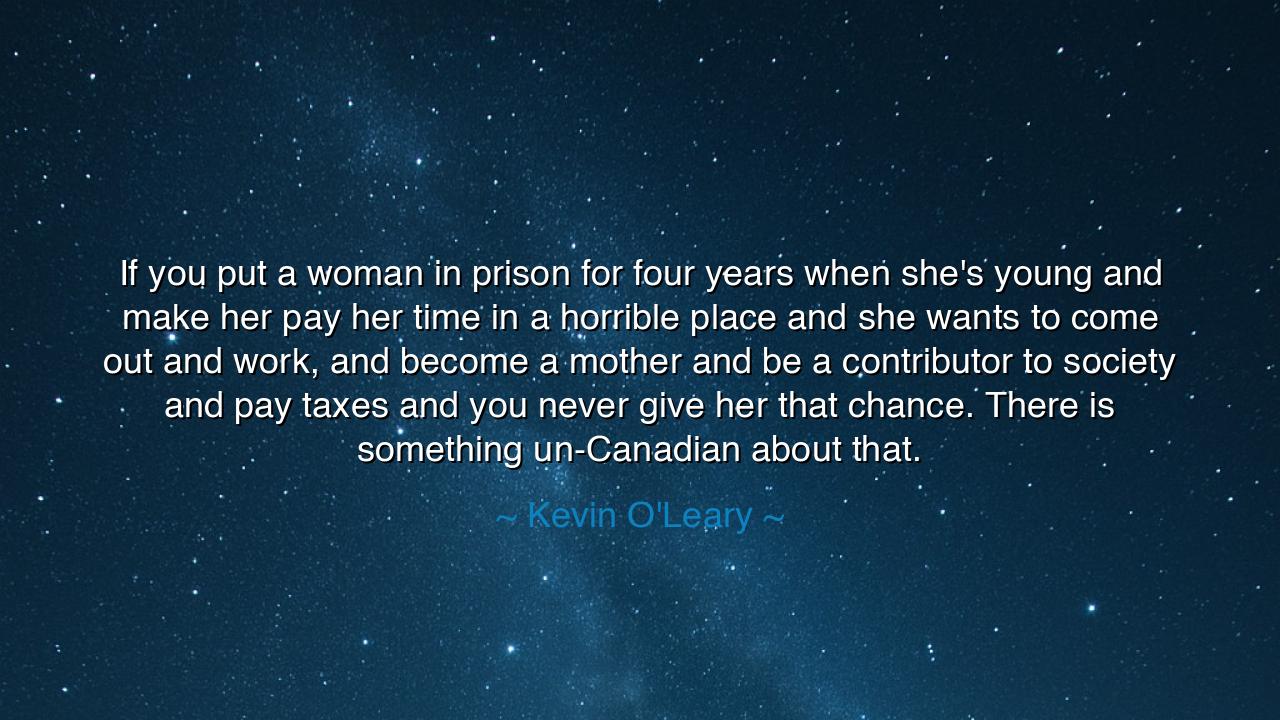
If you put a woman in prison for four years when she's young and
If you put a woman in prison for four years when she's young and make her pay her time in a horrible place and she wants to come out and work, and become a mother and be a contributor to society and pay taxes and you never give her that chance. There is something un-Canadian about that.






In the grand tapestry of society, there are threads woven with both justice and mercy, and when these threads are frayed, the entire fabric of the community is weakened. Kevin O'Leary, in his impassioned words, speaks to a truth that lies deep within the heart of human decency and justice: “If you put a woman in prison for four years when she's young and make her pay her time in a horrible place and she wants to come out and work, and become a mother and be a contributor to society and pay taxes and you never give her that chance, there is something un-Canadian about that.” With these words, O'Leary calls upon the virtues of compassion, second chances, and the moral duty we owe to one another as human beings.
The notion that a person—any person—should be punished for their mistakes is not in dispute; even the ancients recognized the necessity of consequences for wrongdoing. But in their wisdom, they also understood that punishment should not be the end of the story. Solon, the great lawgiver of Athens, believed that the purpose of law was not simply to inflict punishment, but to enable the possibility of reform. He understood that a person’s life is not defined by a singular mistake, but by the journey they undertake to redeem themselves. O'Leary’s words resonate with the ancient understanding of justice—a justice that is not blind to the potential of growth and redemption. It is not the punishment alone that matters, but the opportunity for rehabilitation and contribution to society.
Consider the story of Hester Prynne, the protagonist in Nathaniel Hawthorne’s The Scarlet Letter. Condemned by society for a single act of sin, Hester is made to wear the symbol of her mistake—the scarlet letter “A”—for all to see. But through her suffering, she transforms, not just herself but her community, by providing for the poor, caring for others, and ultimately showing that one can move beyond their past. Hester’s story is not one of permanent shame, but of the possibility of renewal. The society that condemned her fails to see the potential for change, just as O'Leary suggests that modern systems may fail to see the potential of a woman coming out of prison, eager to contribute once more.
History teaches us that every great society is judged not by how it punishes its criminals, but by how it offers them the chance to rebuild. Nelson Mandela, after spending 27 years in prison, emerged not with bitterness, but with a desire to heal and serve his people. His story is one of profound humanity and forgiveness, demonstrating the power of second chances. Imagine, then, if society had refused to allow Mandela the opportunity to contribute after his imprisonment—what a loss that would have been, not just to him, but to the world. O'Leary calls for this same kind of opportunity for those who have paid their dues and wish to rejoin society as contributing members, capable of raising families, working, and adding to the social fabric.
Yet, the challenge is great, for there are many who, when faced with a person’s past mistakes, are unwilling to allow them the opportunity for redemption. Society tends to see the stigma of the past as a barrier too high to overcome. But in truth, it is not the past that defines a person, but the future they are capable of building. In every person lies the potential for transformation, the capacity to grow and change, to contribute in ways that would not have been possible without their hardships. By denying people the chance to rebuild, society denies itself the opportunity to benefit from the wisdom that comes from experience and growth.
So, what lesson should we take from O'Leary’s words? We must remember that justice is not solely about punishment, but about the possibility of transformation. When we offer someone a chance to change, we not only serve their human dignity, but we serve the greater good of our society. The act of forgiveness, of offering second chances, creates a society that is humane and capable of healing. We must ask ourselves: what kind of society do we want to build? One that locks people in the past, forever bound by their mistakes? Or one that offers the possibility of a better tomorrow, where each person is judged by their capacity to change and contribute?
Thus, let us follow this ancient wisdom and modern call to compassion. We must advocate for systems that offer individuals the chance to re-enter society, to heal from their past, and to contribute once again. For when we deny them that chance, we deny not just their potential, but the potential of the community as a whole. The lesson here is not just for those who have been imprisoned or who have fallen short, but for all of us—to embrace the values of forgiveness, mercy, and second chances, and to build a world where people are not defined by their past, but by the future they are capable of creating.






AAdministratorAdministrator
Welcome, honored guests. Please leave a comment, we will respond soon